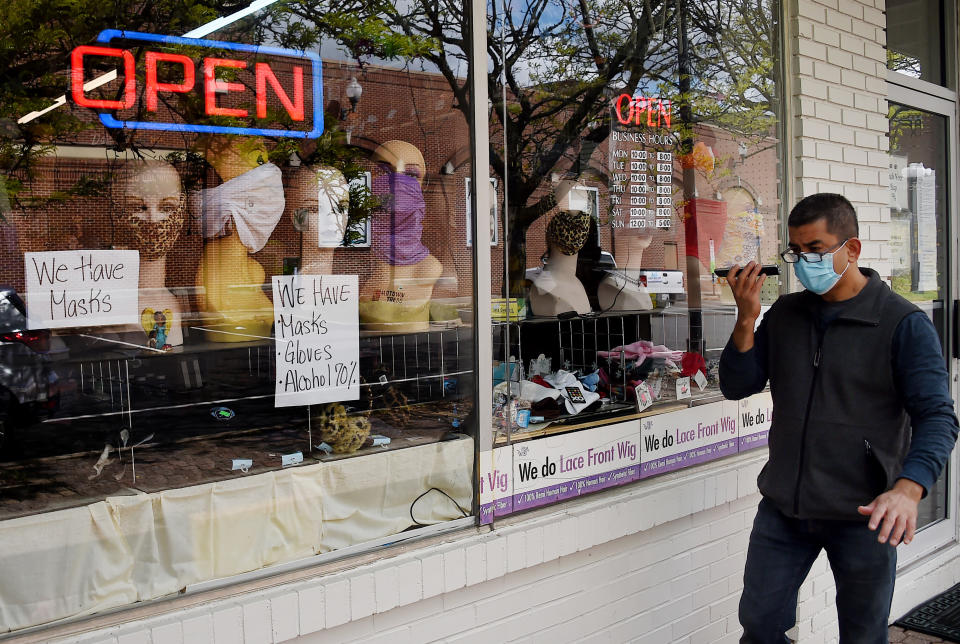What is a recession: Yahoo U
For more business and finance explainers, check out our Yahoo U page.
Business closures and layoffs across the U.S., along with a gross domestic product that turned negative for the first time since 2014, have raised concerns about the depth and length of the recession that the U.S. likely finds itself in amid the novel coronavirus.
One challenge with defining a recession: It can only be declared after data can confirm that there’s been one. As a result, the country may already be in recession that won’t be officially declared until months from now.
The r-word has raised a number of questions: what is a recession, who gets to define it, and how do we know if we are in one right now?
What is the definition of a recession?
A recession is generally perceived to be two consecutive quarters of negative growth in U.S. production, measured as real GDP.
But the National Bureau of Economic Research, which has a “dating committee” dedicated to declaring recessions, makes it clear that there are other criteria that can constitute a recession. The committee looks for a “significant decline in economic activity” across an economy, which covers not just GDP but factors like real income and employment, as well as retail and manufacturing sales.
For example, the dot-com bubble in 2001 was an NBER-defined recession even though there were not two consecutive quarters of negative GDP growth. But gross domestic income contracted for three consecutive quarters, which led the NBER to ultimately declare the period an official recession.
When is a recession declared?
Because the NBER relies on backward-looking data to determine the state of the economy, declaring a recession can take as long as 11 months. That was the case for the financial crisis; the NBER declared on December 1, 2008 that the recession had started almost a year earlier, in December 2007.
One reason why calling a recession can take so long: in order to determine the beginning of a period of “significant decline,” the committee has to identify the peak of economic activity at which the recessionary conditions began gripping the economy.
By definition, that means the committee has to wait for months or quarters of data showing negative effects before it can determine that a specific point in time was the peak of the now-compromised economic cycle.
Sometimes economic conditions make it easier to determine that the economy has fallen from its peak. The Volcker shock of 1981, which triggered a nearly year-and-a-half recession, was only six months deep when the NBER declared July 1981 as the peak.
Is the U.S. headed for a recession because of the coronavirus?
The consensus appears to be that the U.S. is already in one.
Goldman Sachs wrote April 27 that GDP figures for Q1 2020 will likely be the weakest in a decade, thus “confirming an economy already in deep recession.”
Economists were saying since March that the U.S. may have already slipped into a recession.
San Francisco Fed President Mary Daly told Yahoo Finance on March 31 that a downturn is unavoidable when millions of people are losing their jobs.
“What we do know for sure is that if we're not already in the recession right now, we will be and I expect we already are,” Daly said.
Wells Fargo wrote March 25 that it expects the deliberate stoppage of large portions of the U.S. economy to negatively impact all four of the NBER’s evaluation criteria: real production, real income, employment, and sales.
“The U.S. economy is headed for imminent recession even if the four indicators used by the dating committee at the National Bureau of Economic Research do not yet show it,” the Wells Fargo note stated.

How long do recessions last?
Among the 32 recessions defined by the NBER (dating back to 1857), the average length of a recession is 17.5 months.
When would we know if we’re out of a recession?
The NBER has the same protocol for declaring the end of a recession as it does for the beginning of one.
It relies on months or quarters of data to determine that the economy reached the bottom, or the “trough,” of the recession. During the process, the NBER looks at the same criteria that it used when declaring an economic peak.
The same lag applies to declaring a trough. For the last financial crisis, the NBER declared the trough as having happened in June 2009, but did not come to that conclusion until well over a year later, in September of 2010.
Brian Cheung is a reporter covering the Fed, economics, and banking for Yahoo Finance. You can follow him on Twitter @bcheungz.
Read the latest financial and business news from Yahoo Finance
Follow Yahoo Finance on Twitter, Facebook, Instagram, Flipboard, SmartNews, LinkedIn, YouTube, and reddit.

 Yahoo Finance
Yahoo Finance 
